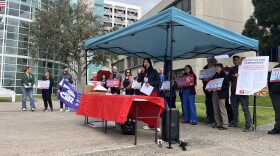ROBERT SIEGEL, HOST:
From NPR News, this is ALL THINGS CONSIDERED. I'm Robert Siegel.
AUDIE CORNISH, HOST:
And I'm Audie Cornish.
All this week we're hearing from NPR's Kelly McEvers on MORNING EDITION and again on our program. She recently spent a week in Syria with rebel fighters. And today, a story about a terrible killing. And a warning, it includes some graphic details.
SIEGEL: Earlier this month in a Syrian village called Tremseh, at least 100 people were killed. Activists called it a massacre of innocent civilians by government forces. But the truth may be more complicated.
Here's Kelly McEvers with the fourth story in a series about her trip to Syria.
KELLY MCEVERS, BYLINE: In the days after the killing in Tremseh, the details were pretty fuzzy. Anti-government activists said the Syrian army and pro-government militias went on a rampage, killing civilians in Tremseh simply because they oppose the government.
But unlike with previous massacres, the activists didn't release the names of the dead. And once some names did start trickling out, it looked like many of those killed were fighting-age men.
(SOUNDBITE OF A VEHICLE)
MCEVERS: On our way into Syria last week, we met a Spanish photographer named Daniel Leal Olivas. It was late at night at a rebel way-station. He said he'd just returned from Tremseh. He was there just one day after the killing.
DANIEL LEAL OLIVAS: The first thing I remember is that it's a very small town. Another thing is everyone was in the street.
MCEVERS: Women and children were standing in front of their houses crying, as if they'd just gotten back into town, Daniel says. The men grabbed him by the arm and dragged him into a house.
OLIVAS: We found a toilet room. And in that toilet room was full of blood. And they told us we found here bodies, executed.
MCEVERS: And he says parts of the village were destroyed.
OLIVAS: They burned a lot of cars. They burned motorcycles. They burned houses. They destroyed the mosque.
MCEVERS: But they didn't burn indiscriminately, he says. Instead, it looked like the killers knew exactly what their targets were. On any given street, one house would be burned, riddled with bullet holes and covered in blood. Other houses were left untouched.
While Daniel's account suggests that those who committed the killings were mostly targeting fighters, there's still the question: What sparked this killing and why was it so brutal? As we made our way deeper into Syria, we found rebel fighters who had some answers.
I'm standing on the steps of a house that's used as a base for a rebel commander. I can't say exactly where it is - the location is secret. The commander commands several units in a town right next to Tremseh, and he provided weapons to two other units that were based inside Tremseh. So we're going to get the story here in this base of what happened, as far as the rebels see it.
KHAZZAFI: (Foreign language spoken)
MCEVERS: This fighter, who goes only by the name Khazzafi, was in a village near Tremseh on the day of the killing. He says the trouble started around 5 A.M.
KHAZZAFI: (Foreign language spoken)
MCEVERS: Four officers in the Syrian army were driving near Tremseh. All of them were from the minority Alawite sect, the same sect as Syria's president and his inner circle. Khazzafi says rebels blew up the car with a homemade bomb, instantly killing the Alawite officers. Then the army responded by bombarding the town with artillery, tanks and helicopters.
KHAZZAFI: (Foreign language spoken)
MCEVERS: Khazzafi says the shelling continued until mid-afternoon. Then the army pulled back, and armed Alawite militias known as Shabiha, or ghosts, moved in and went on a killing spree. Khazzafi was in the woods just outside the village, helping evacuate wounded. He says he heard this chilling phrase spoken with an Alawite accent...
KHAZZAFI: (Foreign language spoken)
MCEVERS: He's not dead yet. Finish him.
If Khazzafi's story is true, this would be the third major killing rampage launched by pro-government Alawite militias in a Sunni village. For the first time, though, rebels are admitting that they played some role in sparking the attack. Still, the rebels refuse to acknowledge that their very presence in these villages brings havoc on civilians.
ABU SLEIMAN: (Foreign language spoken)
MCEVERS: The commander of this base, Abu Sleiman, says regardless of what caused the attack, the killing of a few officers does not justify hunting 100 people down and executing them in their village.
While many details from Tremseh remain unknown, it's clear that sectarian killings are on the rise in Syria.
UNIDENTIFIED MAN: (Singing in foreign language)
MCEVERS: As Abu Sleiman and his fighters begin their nightly prayer, it's clear by the way they move their hands and position their feet that they're not Sunni hardliners who consider all other sects to be infidels. But to hear them talk is to hear them use nasty words about Alawites and about how they hope to take revenge one day. That leaves many Syrians to wonder: Even if the rebels do manage to topple the regime, what will come next?
Kelly McEvers, NPR News. Transcript provided by NPR, Copyright NPR.






